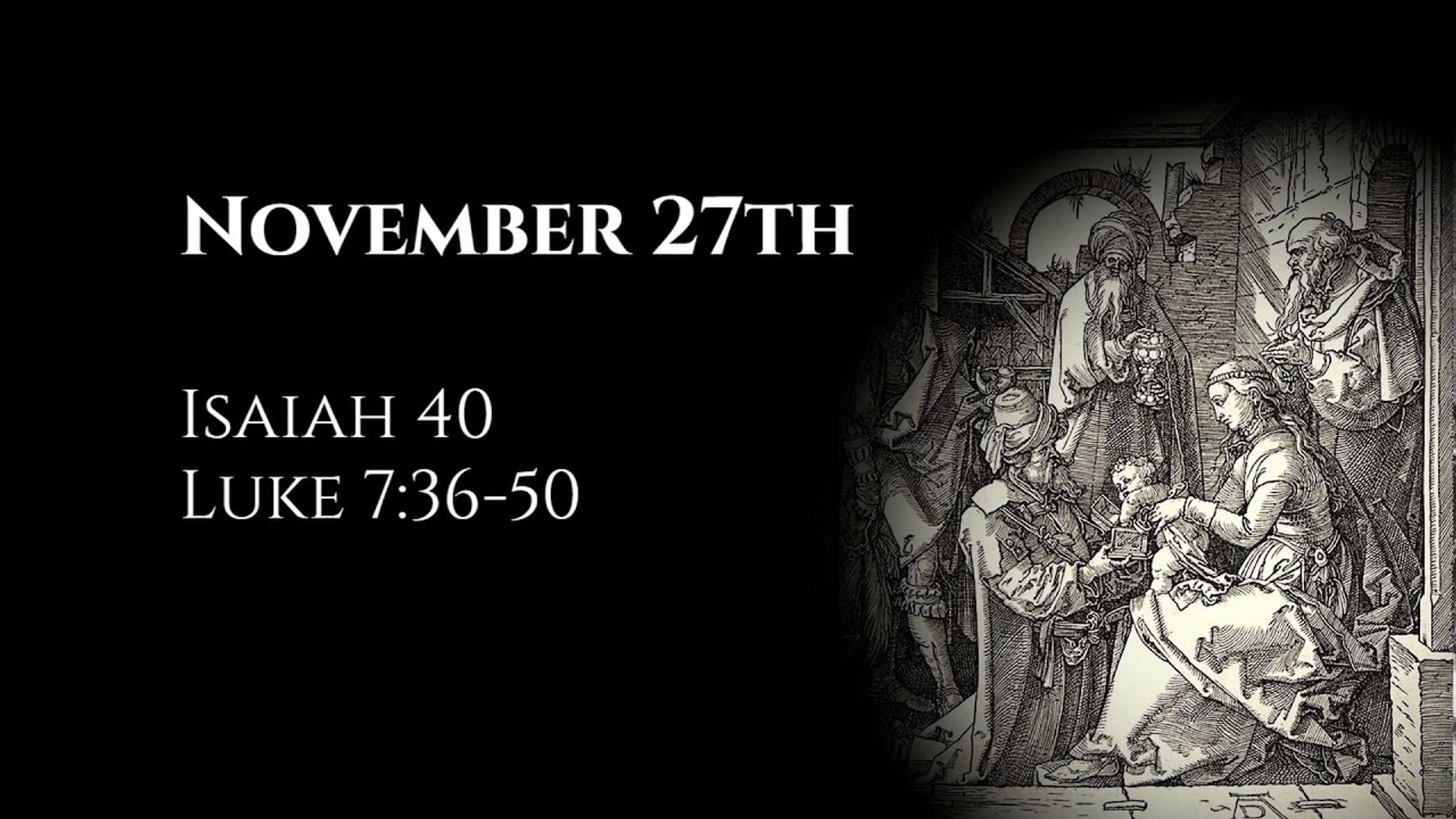November 27th: Isaiah 40 & Luke 7:36-50
November 26, 2021

Alastair Roberts
Comfort, comfort my people. A sinful woman anoints Jesus' feet.
My reflections are searchable by Bible chapter here: https://audio.alastairadversaria.com/explore/.
If you are interested in supporting this project, please consider supporting my work on Patreon (https://www.patreon.com/zugzwanged), using my PayPal account (https://bit.ly/2RLaUcB), or buying books for my research on Amazon (https://www.amazon.co.uk/hz/wishlist/ls/36WVSWCK4X33O?ref_=wl_share).
You can also listen to the audio of these episodes on iTunes: https://itunes.apple.com/gb/podcast/alastairs-adversaria/id1416351035?mt=2.
More From Alastair Roberts
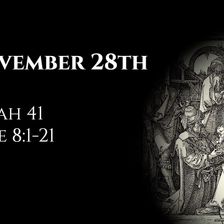
November 28th: Isaiah 41 & Luke 8:1-21
Alastair Roberts
November 27, 2021
Fear not, for I am with you. The Parable of the Sower.
My reflections are searchable by Bible chapter here: https://audio.alastairadversaria.com/expl
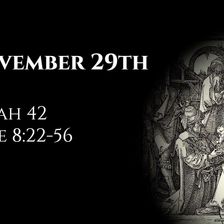
November 29th: Isaiah 42 & Luke 8:22-56
Alastair Roberts
November 28, 2021
Behold, my Servant. Calming the storm, delivering the Gerasene demoniac, and healing the woman with the issue of blood and Jairus' daughter.
My refle
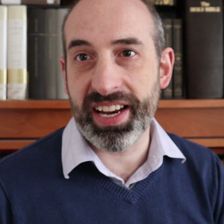
The Final Stretch and an Upcoming Course on the Patriarchs!
Alastair Roberts
November 29, 2021
Sign up for Davenant programmes and courses here: https://davenantinstitute.org/davenant-hall (20% off on Cyber Monday!).
If you are interested in su
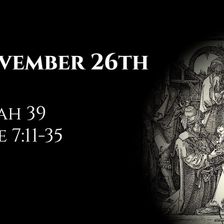
November 26th: Isaiah 39 & Luke 7:11-35
Alastair Roberts
November 25, 2021
The visit of the Babylonian envoys. Messengers from John the Baptist.
My reflections are searchable by Bible chapter here: https://audio.alastairadve
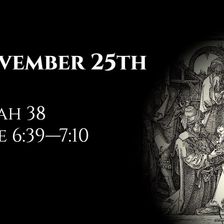
November 25th: Isaiah 38 & Luke 6:39—7:10
Alastair Roberts
November 24, 2021
The healing of Hezekiah. The conclusion of the Sermon on the Plain and the faith of a centurion.
My reflections are searchable by Bible chapter here:
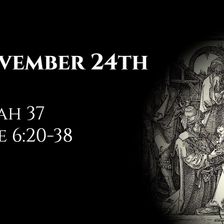
November 24th: Isaiah 37 & Luke 6:20-38
Alastair Roberts
November 23, 2021
The Lord delivers Jerusalem from the Assyrians. The Sermon on the Plain.
My reflections are searchable by Bible chapter here: https://audio.alastaira
More on OpenTheo

What Are Some Good Ways to Start a Conversation About God with Family Members?
#STRask
October 30, 2025
Questions about how to start a conversation about God with non-Christian family members, how to keep from becoming emotional when discussing faith iss

Why Would Any Rational Person Have to Use Any Religious Book?
#STRask
December 8, 2025
Questions about why any rational person would have to use any religious book, whether apologetics would be redundant if there were actually a good, un

Is 1 Corinthians 12:3 a Black-and-White Tool for Discernment?
#STRask
October 27, 2025
Questions about whether the claim in 1 Corinthians that “no one can say ‘Jesus is Lord’ except in the Holy Spirit” is a black-and-white tool for disce

Why Are So Many Christians Condemning LGB People Just Because of How They Love?
#STRask
January 15, 2026
Questions about Christians condemning LGB people just because of how they love, how God can expect someone to be celibate when others are free to marr

Is Greg Placing His Faith in the Wrong Thing?
#STRask
February 12, 2026
Questions about Greg placing his faith in his personal assessment of which truth claims best match reality rather than in the revelation of God in Jes

How Do You Justify Calling Jesus the Messiah?
#STRask
December 18, 2025
Questions about how one can justify calling Jesus the Messiah when he didn’t fulfill the Hebrew messianic prophecies, and whether the reason for the v

Why Is It Necessary to Believe Jesus Is God?
#STRask
February 19, 2026
Questions about why it’s necessary to believe Jesus is God, whether belief in the Trinity is required for salvation, and why one has to believe in the

What Tools of Reasoning Help You Know What’s True, Right, and Good?
#STRask
December 4, 2025
Question about what tools of reasoning help us determine whether something is true or false, right or wrong, good or bad before bringing Scripture int

Shouldn’t I Be Praying for My Soul Rather Than for Material Things?
#STRask
February 2, 2026
Questions about whether we should be praying for our souls rather than for material things, why we need to pray about decisions, whether the devil can

Why Does the Bible Teach You How to Be a Proper Slave Owner?
#STRask
November 13, 2025
Question about why it seems like the Bible teaches you how to be a proper slave owner rather than than saying, “Stop it. Give them freedom.”
* It s

Lora Ries: Border Security and Immigration Policy
Knight & Rose Show
December 7, 2025
Wintery Knight and Desert Rose welcome Lora Ries to discuss border security and immigration policy. They explore Biden's policy changes, like ending R

Does Open-Mindedness Require Studying Other Religions Before Becoming a Christian?
#STRask
February 9, 2026
Questions about the claim that if Christians really want to be open-minded, they need to read and study other religions before committing to Christian

Does God Really Need a “Pound of Flesh” to Forgive Sins?
#STRask
January 12, 2026
Questions about how to answer the challenge that God doesn’t need a “pound of flesh” to forgive sins but can simply forgive, and whether the claim in

When I Can’t Stop Thinking About Something, Is That God Speaking?
#STRask
December 1, 2025
Questions about whether having a recurring thought is an indication God is speaking to you, what to say to someone who says they sinned because “God t

What Do You Think About Churches Advertising on Social Media?
#STRask
January 19, 2026
Questions about whether there’s an issue with churches advertising on social media, whether it’s weird if we pray along with a YouTuber, and whether C
